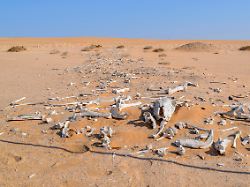Migration drivers
UNESCO sees world peace threatened by water scarcity
March 22, 2024, 8:14 a.m
Listen to article
This audio version was artificially generated. More info | Send feedback
Water is a valuable commodity. Waste in industrialized countries is offset by shortages in Africa and Asia. About half of the world’s population suffers from this. In its water report, UNESCO warns of possible consequences that could affect everyone.
According to the UN cultural organization UNESCO, increasing water scarcity can fuel conflicts around the world. “If we want to maintain peace, we must act quickly not only to protect water resources, but also to strengthen regional and global cooperation in this area,” said Director-General Audrey Azoulay at the release of UNESCO’s annual water report.
According to this, around half of the world’s population suffers from severe water shortages, at least seasonally. And more than two billion people live without access to clean drinking water. Around 3.5 billion people cannot use clean sanitation facilities. According to the information, population growth is not necessarily responsible for the increasing demand for water: Where the population is growing fastest, per capita consumption is often lowest.
According to the information, freshwater consumption is increasing by one percent annually. It was said that the reason was changed eating habits. Even though almost 70 percent of the fresh water taken from the natural cycle goes to agriculture, industry (20 percent) and households (10 percent) are primarily responsible for the increasing demand. Water scarcity also has negative consequences for women and girls, especially for their school education. In many rural areas, they are said to be responsible for the increasingly time-consuming water supply – which affects training. According to the report, the lack of water is also seen as a driver for migration.
“It is almost always the poorest and most vulnerable groups whose well-being and existence are most at risk,” says the UNESCO report. Contrary to expectations, water has not yet developed into a significant “trigger” for conflicts. According to UNESCO, water scarcity has the potential to spark disputes. For example, the drainage of wetlands in the Sahel region of Africa – for example through ill-conceived water development projects – has led to disputes over access to water and fertile land.
UNESCO warns of wars over water
“Due to climate change, among other things, there is increasing water scarcity, more conflicts and there is a risk that there could be wars over water in the future,” said Sonja Köppel, head of the UN Water Convention Secretariat. UNESCO therefore recommends more cooperation on transboundary water use, for example through the Water Convention.
The 1992 convention helps neighboring countries that share water resources establish common management to prevent conflict. According to Köppel, it is currently experiencing a boom: The agreement was originally designed for the Europe and Central Asia region, but has been open to countries all over the world since 2016. Since then, the number of members has increased from 41 to 52. Another 30 countries are in the process of joining. “We have seen over the past years and even centuries that shared water management has played a role as a peacemaker,” she said.
Water cooperation as a solution to the problem
The neighbors of the Sava River – Slovenia, Croatia, Bosnia-Herzegovina and Serbia – concluded an international agreement shortly after the end of the war in 2002, which, among other things, dealt with the exchange of data on water quality and quantity. This has led to further collaborations, for example in the area of environmental protection. “This contributed to the pacification of the region.”
There was also closer cooperation on the management of shared rivers between Ukraine and Moldova and between Kazakhstan and Kyrgyzstan. Belarus and Lithuania also managed to develop a protocol on the management of a common river through initial technical cooperation. However, this agreement is currently on hold due to the political situation in view of the Russian war of aggression against Ukraine.
153 countries worldwide share water resources with neighboring countries. Only 24 have so far made agreements with neighboring countries on all rivers and lakes in their territory. This includes Germany.
